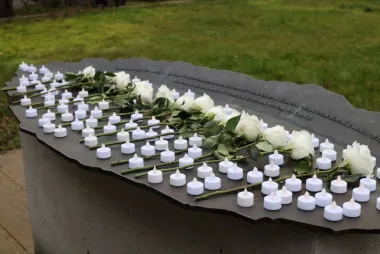Applied Science co-op student pivots to EDI.I amid the pandemic

Edited: July 6, 2022
A distinctive setting
The year 2020 will forever be tied to the global pandemic, and because of that it will also be remembered as the year of the pivot. In-person classes went online, folks who had previously worked in shared offices now established themselves at home, and co-op students found themselves scrambling when industry employers instituted a hiring freeze.
Ashley Kairu, a chemical and biological engineering student at the University of British Columbia, found herself in this difficult position, but her panic was short-lived because the UBC co-op office was able to place her on campus for an opportunity that would count toward her co-op credits. For Ashley, this pivot turned out to be an important working experience.
A unique worldview to share
Before landing a co-op role with the Faculty of Applied Science EDI.I office as an Equity Ambassador, Ashley was already entrenched in campus diversity issues as the president of the UBC Africa Awareness Initiative. It was the one group she was committed to joining even before departing her home country of Kenya pre-pandemic. Like others, she was looking for community; the kind of community she wasn’t necessarily going to find anywhere else.
As a Black woman, her lived experience certainly played a part in how she approached her co-op role. She was an active part of putting together the Anti-Racism Speaker Series, which was the product of listening sessions held by the Faculty of Applied Science’s EDI.I office in February 2021. These sessions were an opportunity to hear from IBPOC faculty, staff and students about their experiences in the Faculty.
Diversity on campus matters
The topics of the speaker series were inspired by what the organizers had learned during the listening sessions. “Some of the common themes were around hiring and mentorship,” says Ashley. “Some students mentioned not seeing professors that look like them.”
Ashley gives the rhetoric surrounding the issue of diversity (or lack of) on campuses across North America a human voice. “Being the only ‘insert whatever identity you are’ is tough often because you're seeing people who don’t look like you and you’re noticing that,” says Ashley, adding that “perhaps they’re noticing it too.”
She stresses that the impact of seeing diverse professors is not just about what goes on in the classroom— “A role model in the classroom is important because seeing them everyday gives you less of that imposter syndrome feeling. Seeing through your own lenses, someone who is like you and you could be like. ”
The current lack of diversity in STEM is one of many topics the speakers discussed during the series.
A lifelong commitment
Heading into 2020, surely Ashley never would have imagined what kind of co-op role she’d eventually land. But one thing’s for certain, having the opportunity to shape EDI.I initiatives at UBC has made quite the impression on her.
Despite being a leader in this area, Ashley isn’t quite certain what role formal EDI.I engagement will play in her future. But as the founder of the UBC Chapter of the National Society of Black Engineers, she’s sure of at least one thing: she’ll continue educating herself—and others—in any way she can.
Meet the speakers: Anti-Racism Speaker Series
- Anthonia Ogundele: Founder and Executive Director of Ethọ́s Lab
- Dr. Margaret Moss: Interim Associate Vice President of Equity and Inclusion at UBC
- Cicely Belle Blain: CEO of Bakau Consulting


